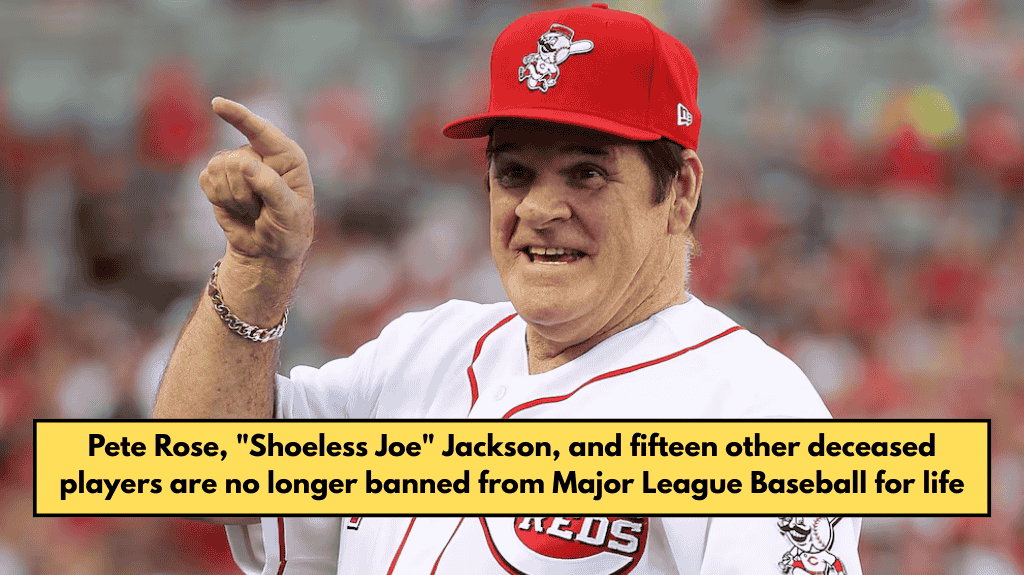In a historic decision that could reshape baseball’s Hall of Fame, Major League Baseball announced Tuesday that Pete Rose, “Shoeless” Joe Jackson, and 15 other deceased players have been removed from the sport’s permanent ineligibility list, opening the door to potential Cooperstown induction.
The landmark decision brings an end to decades of debate over some of baseball’s most contentious figures, though MLB Commissioner Rebecca White emphasized that removal from the banned list does not guarantee Hall of Fame election, according to NPR.
“Major League Baseball has lifted the lifetime ban of Pete Rose, ‘Shoeless’ Joe Jackson and 15 other deceased players,” according to NPR. “The move clears the way for a Hall of Fame vote but doesn’t guarantee admission.”
Historic Decision
The announcement effectively concludes baseball’s longest-running and most contentious disciplinary proceedings. Rose, baseball’s all-time hits leader with 4,256 hits, was banned in 1989 after an investigation found that he bet on games while managing the Cincinnati Reds.
Jackson, widely regarded as one of baseball’s greatest hitters with a.356 lifetime batting average, was banned along with seven other Chicago White Sox players for allegedly fixing the 1919 World Series in what became known as the “Black Sox Scandal.”
Commissioner White, who took office in January, emphasized that the decision only affects deceased players and does not change MLB’s stance on gambling. “The game’s integrity remains our top priority,” White stated at the press conference announcing the change. “However, after careful consideration, we’ve determined that permanent posthumous ineligibility serves no continuing disciplinary purpose.”
The decision also affects players who have been suspended for other infractions, such as violating baseball’s drug policies and other integrity issues, though MLB did not immediately release a complete list of the 17 affected players.
Hall of Fame Implications
While the decision removes a significant barrier to Hall of Fame consideration, it does not guarantee enshrinement for any of the players involved. The Baseball Hall of Fame, which operates independently of the MLB, must now decide how to handle the newly eligible candidates.
According to a statement from the Hall of Fame, its board of directors will meet next month to form a special committee to review the cases of Rose, Jackson, and others. “The Hall of Fame respects MLB’s decision and will thoughtfully consider its implications for our election procedures,” said Hall of Fame President Christopher Williams.
Rose, in particular, has lobbied for reinstatement for more than three decades, and the posthumous eligibility provision means he will not live to see potential induction. Rose, now 84, has stated that he bet on baseball, including his own team, but never bet against the Reds or fixed any games.
Public Reaction
Fans, former players, and baseball historians have all responded to the announcement differently. Supporters argue that the decision acknowledges these players’ complicated legacies while properly recognizing their on-field accomplishments.
“This isn’t about forgetting what happened or condoning violations of the game’s integrity,” baseball historian Claire Martinez explained. “It’s about acknowledging that permanent posthumous exclusion is a punishment that extends beyond what’s necessary or productive.”
Critics, however, are concerned about the message it sends about sports gambling, especially as legalized sports betting expands across the United States. “Baseball’s gambling rule was created for a reason,” said former commissioner Fay Vincent in a statement to Fox News. “The lifetime ban’s permanence was essential to its deterrent effect.”
Reaction from families
Families of the affected players expressed mixed feelings about the decision. Pete Rose Jr., Rose’s son, told reporters that he was “gratified but saddened” that his father might not live to see his potential Hall of Fame induction.
The descendants of Joe Jackson, who died in 1951, issued a statement saying they were “deeply grateful that Joe’s extraordinary talents might finally receive the recognition they deserve.” Jackson’s supporters have long maintained that his involvement in the Black Sox Scandal was minor, and that his outstanding performance in the 1919 World Series—batting.375 with the series’ only home run—proved his innocence.
“Joe’s story is more complex than history has sometimes portrayed it,” said Jackson’s great-grandniece, Katie Jackson-Thompson. “We’re hopeful this decision will allow for a more nuanced understanding of his legacy.”
Historical Context
The decision comes amid a broader cultural debate over how sports should deal with complex legacies. Last month, the International Olympic Committee restored Jim Thorpe’s only gold medal victories from the 1912 Stockholm Olympics, redressing a century-old injustice.
Some sports analysts have linked MLB’s decision to the evolving landscape of gambling and sports. With major sports leagues now partnering with betting companies and fantasy sports becoming deeply embedded in fan culture, some observers believe the absolute prohibition on any association with gambling is becoming increasingly out of date.
“Rose and Jackson remain warnings, not role models,” wrote Mike Garrison, an Associated Press sports columnist. “But their punishment has served its purpose—deterring others—and keeping their achievements permanently hidden serves no continuing value to the game of baseball.”















